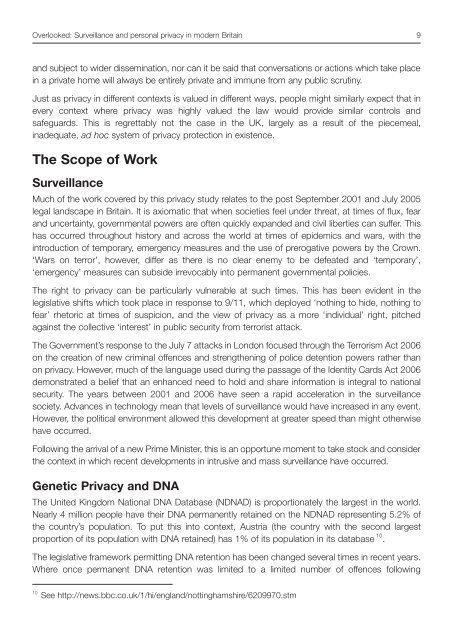Overlooked - Liberty
Overlooked - Liberty
Overlooked - Liberty
Create successful ePaper yourself
Turn your PDF publications into a flip-book with our unique Google optimized e-Paper software.
<strong>Overlooked</strong>: Surveillance and personal privacy in modern Britain 9<br />
and subject to wider dissemination, nor can it be said that conversations or actions which take place<br />
in a private home will always be entirely private and immune from any public scrutiny.<br />
Just as privacy in different contexts is valued in different ways, people might similarly expect that in<br />
every context where privacy was highly valued the law would provide similar controls and<br />
safeguards. This is regrettably not the case in the UK, largely as a result of the piecemeal,<br />
inadequate, ad hoc system of privacy protection in existence.<br />
The Scope of Work<br />
Surveillance<br />
Much of the work covered by this privacy study relates to the post September 2001 and July 2005<br />
legal landscape in Britain. It is axiomatic that when societies feel under threat, at times of flux, fear<br />
and uncertainty, governmental powers are often quickly expanded and civil liberties can suffer. This<br />
has occurred throughout history and across the world at times of epidemics and wars, with the<br />
introduction of temporary, emergency measures and the use of prerogative powers by the Crown.<br />
‘Wars on terror’, however, differ as there is no clear enemy to be defeated and ‘temporary’,<br />
‘emergency’ measures can subside irrevocably into permanent governmental policies.<br />
The right to privacy can be particularly vulnerable at such times. This has been evident in the<br />
legislative shifts which took place in response to 9/11, which deployed ‘nothing to hide, nothing to<br />
fear’ rhetoric at times of suspicion, and the view of privacy as a more ‘individual’ right, pitched<br />
against the collective ‘interest’ in public security from terrorist attack.<br />
The Government’s response to the July 7 attacks in London focused through the Terrorism Act 2006<br />
on the creation of new criminal offences and strengthening of police detention powers rather than<br />
on privacy. However, much of the language used during the passage of the Identity Cards Act 2006<br />
demonstrated a belief that an enhanced need to hold and share information is integral to national<br />
security. The years between 2001 and 2006 have seen a rapid acceleration in the surveillance<br />
society. Advances in technology mean that levels of surveillance would have increased in any event.<br />
However, the political environment allowed this development at greater speed than might otherwise<br />
have occurred.<br />
Following the arrival of a new Prime Minister, this is an opportune moment to take stock and consider<br />
the context in which recent developments in intrusive and mass surveillance have occurred.<br />
Genetic Privacy and DNA<br />
The United Kingdom National DNA Database (NDNAD) is proportionately the largest in the world.<br />
Nearly 4 million people have their DNA permanently retained on the NDNAD representing 5.2% of<br />
the country’s population. To put this into context, Austria (the country with the second largest<br />
proportion of its population with DNA retained) has 1% of its population in its database 10 .<br />
The legislative framework permitting DNA retention has been changed several times in recent years.<br />
Where once permanent DNA retention was limited to a limited number of offences following<br />
10<br />
See http://news.bbc.co.uk/1/hi/england/nottinghamshire/6209970.stm















